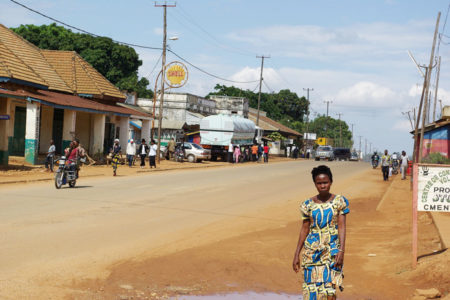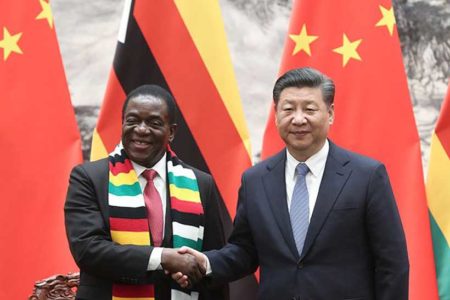
In 1990, the UN made a commitment to reduce global poverty by 50% within 25 years. That this ambitious goal has been achieved is largely due to China’s success. Within the same period, the percentage of the population living below the poverty line decreased from 56.8% to 42.7% across the continent of Africa. However, with 20% of Africans living under the specter of starvation—a higher percentage than anywhere else in the world—there is still a long way to go.
And the situation has not improved in recent years. In fact, it has deteriorated—especially in Africa. “The State of Food Security and Nutrition in the World” report for 2019 was jointly published by several UN organizations and confirms a rise in world hunger for the third year in a row. It is now estimated that there are 821 million chronically undernourished people in the world. In the period up to 2015, this number had been in decline. It has now climbed back to levels last seen in 2011.
Compared to 2017, the proportion of malnourished people (20%) has increased in almost all regions of Africa. The worst-hit regions are East Africa, where almost 31% of the population suffer from malnutrition, and Central Africa, where the figure is 26.5%.
Does Development Aid Really Help?
As soon as the above figures were published, demands for increased development aid for Africa followed reflexively. Development aid has a nice moral ring to it, and in some people’s view, it constitutes a kind of quasi-religious atonement for the sins of colonialism and the “exploitation of the Third World” by capitalist countries. But does it really achieve what its proponents hope it will? In 2002, the then Senegalese President Abdoulaye Wade said:
I’ve never seen a country develop itself through aid or credit. Countries that have developed—in Europe, America, Japan, Asian countries like Taiwan, Korea and Singapore—have all believed in free markets. There is no mystery there. Africa took the wrong road after independence.
In Asia, the fight against poverty and hunger has been so effective because so many Asian countries have implemented capitalist reforms. In China alone—thanks to the partial introduction of private property rights and free-market economics—the proportion of people living in extreme poverty has fallen from 88% in 1981 to below 1% today.
Asian countries have received much less development aid than African countries. Zambia-born Dambisa Moyo, who studied at Harvard and earned a Ph.D. from Oxford, identifies Western development aid as one of the reasons for the failure to rid Africa of poverty. “In the past fifty years, over $1 trillion in development-related aid has been transferred from rich countries to Africa,” Moyo points out in her book Dead Aid.
But has more than $1 trillion in development assistance over the last several decades made African people better off? No. In fact, across the globe the recipients of this aid are worse off; much worse off. Aid has helped make the poor poorer, and growth slower … The notion that aid can alleviate systemic poverty, and has done so, is a myth. Millions in Africa are poorer today because of aid; misery and poverty have not ended but have increased. Aid has been, and continues to be, an unmitigated political, economic, and humanitarian disaster for most parts of the developing world.
To be clear, Moyo’s criticism is not directed against ad hoc famine and disaster relief but against long-term financial transfers aimed at boosting economic development. These funds have frequently ended up in the hands of corrupt despots rather than those of the poor. William Easterly, Professor of Economics and African Studies at New York University, also believes that foreign aid is largely pointless and frequently counter-productive.
Hope For Africa
But there is still hope for Africa. The rise of broadband and mobile technologies has led to a loosening of state control across many industries and allowed entrepreneurs to thrive independent of government support and political connections. Many of this newly emerged class of self-confident young Africans have studied overseas—typically in Europe or the United States, but increasingly in China or India, as well. Many of them work for international corporations before they return to their native countries. Unnoticed by the wealthy global north, Africa is seeing the emergence of a class of entrepreneurs who are driving and shaping the economic upswing across the continent.
Africa offers plenty of economic opportunities. However, some of the predictions of a massive boom across the continent currently bandied about by pundits are based on models that fall short of a realistic appreciation of the facts on the ground. Attempting to replicate Asian success stories in Africa without taking the differences between the two continents into consideration would be too simplistic.
But Africa could definitely learn one thing from Asia: Hunger and poverty are not fought through development aid but through entrepreneurship and capitalism. Even U2’s lead singer Bono, who formerly organized massive festivals to raise aid for Africa and for so long espoused anti-capitalist rhetoric and a seemingly unshakeable belief in foreign aid as a solution to hunger and poverty in Africa, has changed his tune under the weight of evidence to the contrary. “Aid is just a stopgap,” he confessed in 2013 during a speech at Georgetown University. “Commerce and entrepreneurial capitalism take more people out of poverty than aid. We need Africa to become an economic powerhouse.”
via Foundation for Economic Education







Recent Comments